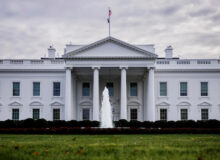In a world of instant everything, just about…there are some things that are known, but they’re in the back of your mind and you just don’t think about them much…if ever.
Once known for luxury automobiles with names like Newport and New Yorker, Chrysler is an Italian-controlled automobile manufacturer registered in the Netherlands with headquarters in London, U.K., for tax purposes. Did you see anything in there about the United States? No? That’s because Chrysler and Dodge, the two remaining brands with Plymouth and DeSoto having been eliminated years back, are no longer considered as American vehicles by me. Ford, to its credit, didn’t take bailout money some years back, and was thought of highly because of it, has gone over the border to Mexico. Contrary to President Trump’s lofty speech, they are an American multinational automaker headquartered in Dearborn, Michigan, but manufacturing of the very popular Ford Fiesta is done in Mexico. To be sure, Ford manufactures other vehicles in other countries, but it was specifically Mexico that the President said would not be making Fords.
Chicken-of-the-sea, that great tuna company is owned by Thailand. Back in 2015, there was an investigation into rumors of “slavery” by Pacific Rim fishing companies. The enslaved men featured in the AP story were brought to Benjina, Indonesia and forced to fish for products that were then shipped to Thailand, where they entered the global seafood market, including American supply chains. Now you might be asking, “What about Charlie the tuna?”…and here’s the skinny on that. “Charlie the Tuna,” the company’s half-century old cartoon character, might have been espousing “good taste,” but nobody from Star-Kist Co. would show the FDA employee the records. Star-Kist, once a unit of San Francisco-based Del Monte Foods, is now owned by South Korea’s Dongwon Industries. A general note here…although not publicly announced, it is a consensus of “food experts” and average Americans, that fish and seafood products “farmed” in certain Pacific Rim countries are really not fit to eat because of the completely unsanitary conditions in which they are raised.
Since 2002, China has been the world largest exporter of fish and fish products…and the United States gets a lot of things from China, including seafood. Our oceans are polluted and acidifying, affecting fish in ways that we’re still learning about. Thanks to the prevalence of overfishing, one-third of global fish populations are overexploited and dangerously depleted. Meanwhile, mercury levels in fish are extremely high—and getting higher, so says The Smart Seafood Buying Guide. Patrick Woodall, Research Director and Senior Policy Advocate of the non-profit, non-partisan Food & Water Watch said, back in 2015, “We know there is a problem with these imports.” Mr. Woodall went on to say that fish farmers in the TPP partner nations of Vietnam and Malaysia often use veterinary medicines and fungicides that are illegal in the United States to combat disease in overcrowded fish ponds and river cages. That, to me, says you have to be really careful about the “American” products that you buy. It may sound American, but actually be owned by a foreign company.
In a 2013 report by PC World, it was noted that The U.S. military’s reliance on foreign-made products, including telecommunications equipment and semiconductors, is putting the nation’s security at risk by exposing agencies to faulty parts and to the possibility that producing nations will stop selling vital items, according to a new report from the Alliance for American Manufacturing. The current level of risk to the U.S. military’s supply chain is “frightening,” said John Adams, a retired U.S. Army general and president of Guardian Six Consulting, the company that wrote the report. “We incur unacceptable national security risks as we outsource key sectors of the defense industrial base.” We have bought a foreign-made handgun, the Sig Sauer’s P320 to replace the M9, which is made by Beretta, an Italian gun manufacturer. Right about now you might be wondering why we buy foreign guns when there are American made firearms? Not knowing all the particulars my guess would be it’s strictly a matter of dollars. By using foreign-made weapons, are we not allowing them to “own” a part of our military? What happens if these suppliers turn out to be on “the other side” if war comes? How will that affect our warriors?
Parting shot: Every time we buy “outside”, we are(in my not-so-humble opinion) giving up a portion of our sovereignty and the supplier then “owns” a chunk of the United States. We use a round that, according to some articles I’ve read in the past, isn’t the best for knock-down power but it’s being used because it’s the “standard NATO” round. We’ve had American-made weapons with greater power, and they were used very successfully, but are not being used now…why? Once again it’s probably a question of economics rather than success on the battlefield. Let’s think about this one for a moment: where does all the scrap metal go, when we scrap-out a battleship or a carrier? In the UK, scrapped ships are going to Indian companies. In 2011, as reported by The Virginian Pilot newspaper, two ships that cost the United States taxpayers $300 million, and were never completed, were scrapped. At the time the UK won the contract to get them…and we already know that scrapped ships in the UK usually wind up in India.





















Join the conversation!
We have no tolerance for comments containing violence, racism, vulgarity, profanity, all caps, or discourteous behavior. Thank you for partnering with us to maintain a courteous and useful public environment where we can engage in reasonable discourse.